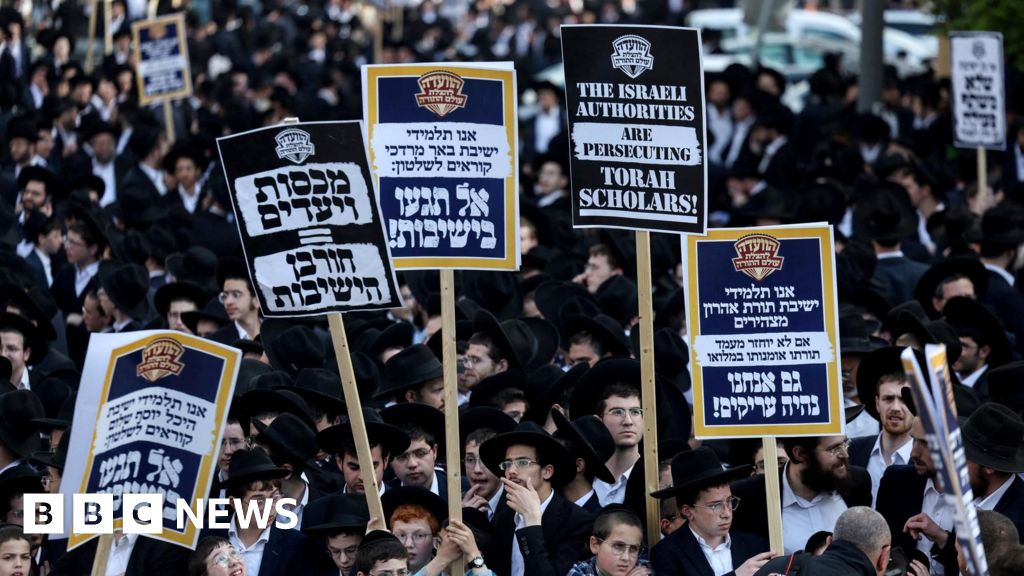Israel’s Supreme Court has unanimously ruled in a landmark case that ultra-Orthodox Jewish seminary students must be drafted to the military.
There have long been exemptions for conscription for young men registered in full-time religious study, but a legal arrangement allowing the practice to continue had expired.
The move looks set to send shockwaves through Israel’s governing coalition, which includes ultra-Orthodox, or Haredi, parties.
A waiver from conscription for ultra-Orthodox men had become a more pressing social issue because of the strain on the armed forces caused by the ongoing fighting against Hamas in the Gaza Strip.
“In the midst of a gruelling war, the burden of inequality is harsher than ever and demands a solution,” the top justices said.
The Israeli military is often described as “the People’s Army” with most Israelis, apart from Israeli Arabs, required by law to serve in it.
The ruling of the country’s highest court referred to the fact that large numbers of soldiers had recently been killed while fighting for their country, saying: “Discrimination regarding the most precious thing of all – life itself – is of the worst kind.”
A non-profit group that was one of the main petitioners to the court, the Movement for Quality Government in Israel, welcomed the ruling, describing it as “an historic victory”, and called for immediate action to recruit Jewish seminary, or yeshiva, students.
Data seen by the court suggested some 63,000 ultra-Orthodox men in full-time Torah study have been covered by the waiver. The ruling means that they now potentially face the draft.
The court also ruled that there should be a freeze in public funding for yeshivas whose students evade conscription.
A lawyer who represented a yeshiva association before the court, Shmuel Horowitz, told the BBC that he “was not surprised by the decision but disappointed”, adding: “The courts are not the appropriate forum to solve these kinds of social issues.”
Asked about the likely response from the ultra-Orthodox community, he noted that “they adhere to their rabbis and don’t care much for court”.
He suggested that there was still time for the Israeli parliament to come up with a solution that would make the court ruling obsolete before it goes on recess at the end of July.
Prime Minister Benjamin Netanyahu’s coalition government relies for its survival on two ultra-Orthodox parties which view conscription exemptions as a top political priority – Shas and United Torah Judaism.
They believe that keeping their constituents in Torah study is a way of protecting the people of Israel and maintaining their conservative customs.
Shas leader Aryeh Deri issued a defiant statement in response to the ruling.
“There is no power in the world that can cut off the people of Israel from studying the Torah and anyone who has tried this in the past has failed miserably,” he said.
Housing Minister Yitzhak Goldknopf, the leader of United Torah Judaism, also vowed that “the Holy Torah will prevail”.
With the end of exemptions, it is possible that the ultra-Orthodox parties could exit the coalition, causing the government to collapse and likely leading to new elections at a time when the popularity of Mr Netanyahu’s Likud party has dropped.
The prime minister had been promoting a bill tabled by a previous government in 2022, which sought a compromise by calling for limited ultra-Orthodox enlistment.
In a statement, Likud said that this legislation “significantly increases the recruitment rates of the ultra-Orthodox public, establishes institutional financial sanctions for failure to meet targets, and recognises the importance of Torah study”.
However, critics argue that the legislation was crafted before the war and was now insufficient to deal with the shortage of military manpower.
As well as maintaining troop numbers in Gaza, the military is preparing for a potential war with the powerful Lebanese armed group, Hezbollah. Already it has soldiers mobilised to northern Israel, where there are near daily exchanges of fire across the Lebanon border.
Over the years, there have been a series of legal challenges to the ultra-Orthodox waiver, and previous court decisions have found the system unjust. However, the Supreme Court refrained from making a final decision on the enlistment of yeshiva students, repeatedly referring the issue to parliament to legislate. It has proven unable to do so.
The history of exemptions for the ultra-Orthodox dates back to 1949 – a year after the state of Israel was created.
Back then, there were some 400 yeshiva students in Israel. The country’s founding fathers allowed them to avoid military service because the ultra-Orthodox community and its yeshivas had been decimated by the Holocaust in World War Two.
In modern-day Israel, demographics have changed dramatically. The high birth rate in the ultra-Orthodox community means that it now accounts for 12% of the Israeli population.
According to the Israeli parliament’s State Control Committee, about 10% of the ultra-Orthodox enlist each year, when they reach the conscription age of 18.
Special military units already exist which allow ultra-Orthodox men to serve as combat soldiers by creating conditions conducive to their religious convictions and strict observance of Halakha, or Jewish religious law.

